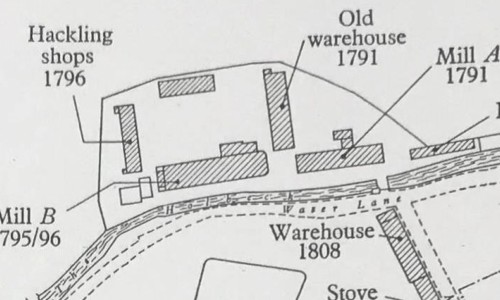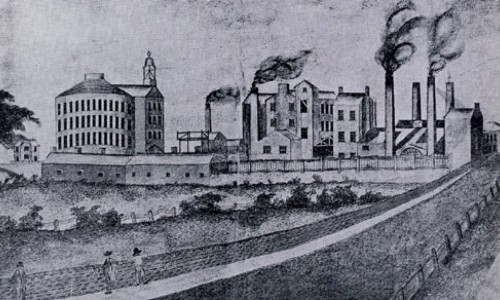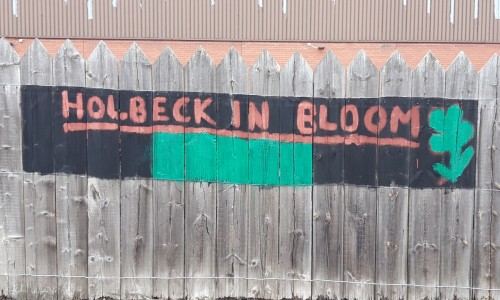The Last Line Of Defence: how regeneration can build people as well
June 12, 2019
.jpg&w=1000&h=600&zc=2&a=l)
Regeneration is about making lasting changes, and not just in a physical sense. Reversing a decline is as much about building people as it is building office blocks, public realm and mixed-use developments. The prime objective of a regeneration scheme should be to stimulate social and economic change, and that means addressing unemployment, poor housing, poor health, crime rates, a lack of facilities and creating a sense of community.
It is possible to regenerate an area without any kind of societal conscience of course, but typically there would be no enduring legacy and a tangible sense that you are merely shifting the problem from one area to another.
Creating community facilities and building new homes is one way a development can leave some form of bequest, but to make it sustainable you need to offer people opportunities. And in order to create some form of utopian vision, could those opportunities materially contribute to the local area you are seeking to revive, perhaps?
The Forging Futures Campus is based at Kirkstall Forge, but is already playing a role in CEG’s proposals for regeneration in the South Bank area as well, and over the next few years will hopefully play an increasingly prominent role in upskilling local people and asking them to make a direct contribution to the dramatic reform of their local area.

(The Forging Futures Campus at Kirkstall Forge)
Leeds College of Building are a key partner in the Forging Futures campus and are also heavily involved in the construction apprenticeship scheme run by CEG. 16 technical apprentices started in September 2018, with a view to working with CEG and the company’s many partners. The apprenticeship scheme is managed by EN:Able Futures/Efficiency North and the kids rotate on a three-monthly basis around the partners who are engaged with it, including CEG, Jonathan Morgan at property specialists Morgan’s City Living, chartered surveyors Fox Lloyd Jones and other partners involved in planning, legal, quantity surveying and construction itself.
As well as the Apprenticeship Academy and the Employability courses, the Forging Futures Campus also hosts Leeds College of Building students for some of their practical site-based sessions, plays a central part in frequent school visits to the Kirkstall Forge site and also runs a bespoke employability course for the MENCAP charity.
Additional training programmes are also managed out of Forging Futures Campus by Ewan Metcalf, the managing director of I Consult and Icon Training, training and education consultancy businesses. Working with CEG and alongside Leeds College of Building, Inspire & Educate, Leeds City Council, EN Able Futures and a wealth of other partners, Ewan is running a specific programme from the campus aimed exclusively at getting people back into work and training opportunities, while at the same time addressing the clear skills shortage that developers like CEG can see in the UK construction industry. It would appear to be a no-brainer to any developer with a semblance of integrity and an awareness of the wider issues surrounding them, but this isn’t always the case.
(Ewan Metcalf, managing director of IConsult and Icon Training)
“I don’t know of anyone doing it the way we do it, with confidence and a bit of swagger” Ewan responds when I ask him why every development company isn’t doing this “there’s lots that invite kids on site, do school visits, offer work placements and engage people in the industry, which is great, but I think what CEG wanted to commit to, and this is why I’m here, was to do more, to do it properly and to create a legacy.”
“The reason I’m so passionate about what I do,” Ewan continues “is that I was ‘that kid’ in a way. I was disengaged and didn’t utilise the opportunities I was given as a teenager. I left school, went to college, dropped out, went to another college, dropped out. I got myself into quite a lot of trouble, risky situations and my life could have spiralled in a completely different direction and God only knows where I might have ended up. I was a bit out of control. In a way that never left me for about ten years. There was an explosion of subcultures in Leeds in the late 80s and early 90s, we were sort of at the forefront of a lot of it, and it got me in a bad place. I had a really disruptive and erratic lifestyle, staying in bed until 1pm, staying up until 5 in the morning; that was pretty regular for me.”
“However, legitimately or not, I was always a survivor and very entrepreneurial, knew how to make money, heavily involved in the black-market economy but didn’t officially start work until I was 21, I worked on sites on the side and signed on. So when I got a job, I wanted to do something that meant something to me, and because of my experiences and because I didn’t have a reason to be like that - I didn’t have a fractured home life I had a really supportive family - I thought ‘well there’s lots of kids who don’t have that luxury’. So I kind of dedicated myself to help people.”
From somewhere, Ewan saw a pathway which he discovered himself.
“From those small acorns I climbed a ladder and worked for a corporate training company for 11 years and got to the top of that ladder, but I didn’t want to be there. I was bored and nowhere near the people that I endeavoured to help, I was kind of stuck in a boardroom doing strategy and I hated it. So that led me to start my own business in 2011. In a way all the bad things I did have shaped me and made me the person I am today. Many of the ‘skills’ that were frowned upon back then and were developed out there on the street serve me well in business and life today, I’m a different person now, a good person I hope…I’ll let others be the judge of that.”

(An excerpt from a letter received from the parent of a graduated learner)
Ewan’s eventual partnership with CEG seems like a pre-destined alliance of like-minded souls, but not just in ethics and vision, also in having the means and the will to actually achieve things. In terms of helping young kids into work or further training, the Forging Futures programme has to deliver something credible and measurable, rather than simply providing an outlet for social discourse or experiences the learners hadn’t previously had access to.
“There’s always a very human side to what we do,” Ewan continues “but there is a process and professional system behind it, so we have to be compliant with assessment processes, with some of these employment and skills courses being funded by ESFA, and we are subject to OFSTED inspections and audits, but the kids would never know that. We make it relevant to construction or their chosen industry and almost deliver stealth learning where the students don’t realise they are doing English and Maths, and complete vast portfolios of work often surprising themselves with their achievements. We meet and greet all the potential learners prior to them starting and invite them to open days so they get familiar with travel, the environment and the people here, in the process removing any apprehension, anxiety and fears they may have manifested. This is often where we make a judgement call on things such as the length of the course, what content needs to be included, what’s realistic achievement-wise. But there is a process driving it, so again, ongoing assessment to see progression, and we do an diagnostic assessment on English, Maths, IT, all their functional skills, really with a view that that will give us a picture of what somebody’s likely to be able to achieve during their time with us.”
Recruitment is not straightforward, however, and while retention and achievement % on the courses is good, it can be a challenge to find kids and get referrals and the attrition rate from referral to start is higher than Ewan would like.
“I’ve met over 200 organisations here personally; showed them what we do and through things like the graduation, we engage people. So there’s a bit of both in terms of the kids coming to us and us going to them. Word of mouth works too, kids passing on to other kids they know in their estate or their communities, that it’s something they should get involved with. Kids that are not engaged are hard to find by definition, and you don’t always know where they are and at what point of their personal journey they are currently on.”
Currently the Forging Futures programme has a 70% outcome rate of people from very diverse backgrounds and abilities going on to find permanent work or further training, and while after-care with those 70% is important, crucially, the remaining 30% are not forgotten either.
“I think all that in-built after-care is just a natural thing for us and the young people often make a relationship with us over that period because we treat them differently, like the young adults they are, and they keep in touch. So if they’re having problems they tend to ring us, which is brilliant. They see us as a bit of an oasis where they come and off-load, and that’s lovely, but we are also delivering some realistic messages to them and using tough love to get them to make changes and be more resilient and determined. And we are keen to work closely with their employers and I think they have a relationship with us which is important, we’re not just placing people transiently into a job, it’s about personal relationships.”

(An excerpt from a letter received from a graduated learner)
“For the 30%” Ewan continues, “the reason we keep changing the course is because, even though 70% sounds great and we’re really proud of it, we want it to be 99 or 100% into work, and why shouldn’t it be? I think it’s fair to say, though, that not everybody who comes on the course is on the same journey and the outcome might not be a job. For whatever reason.”
The walls in Ewan’s office are plastered with letters from graduated learners and their parents, acting as continuous inspiration that it is always worth going that extra mile. Forging Futures has a succession of heart-warming stories where young people with few prospects and dealing with issues such as homelessness, anxiety and social isolation have become ambitious and highly motivated through a transformational change. This has brought the best out of them and showered gratitude on the Forging Futures team both from the learners themselves and their parents.
CEG was also one of the first supporters of the Skill Mill in Leeds, a programme to support young ex-offenders who have been convicted, using accredited learning to acquire employability skills such as CV writing, applying for jobs and researching jobs. The Skill Mill cohorts continue to gain invaluable support and work experience on the Kirkstall Forge site, carrying out important site clearance and flood alleviation work and other jobs that need doing on the site.
Phil Kent of the Skill Mill commented: “The support and financial contribution that The Skill Mill Leeds has received from CEG and in particular the Kirkstall Forge site has been invaluable, both in the setting up of The Skill Mill in Leeds and its continued growth and success. The opportunity for young people to undertake ground work and gain important life skills in a safe, supportive and positive environment has been a huge benefit to both The Skill Mill and its young people”.
Ewan believes that the key to the success of the Forging Futures scheme is ensuring the young kids get the most out of it in terms of the course content, but he is also reliant on employers then fully committing to the scheme and playing their part.
“Historically there’s been a lot of people out there,” Ewan declares “who talked about attracting these kids to the industry and the skills shortage that we are facing, and we need to be more diverse, but they weren’t practicing it, they were merely preaching it. And we see that there’s a verbal approach to that rather than a ‘let’s do something’ approach to it. Thankfully over the last two years we have seen a change with The CITB releasing funding to support the agenda and many contractors starting to employ people in specialist roles and really trying to make a difference, not least in the support they offer myself, my team and my learners. The problem can be that as businesses they are so busy with the day job, which is right in their defence, but quick wins can become a priority. The solution is that there are organisations out there like mine, individuals like me that can, with their collaboration and a cohesive approach, take the pain out of the social value, CSR agenda is for them, and deliver something really life-changing and powerful whilst keeping it simple. As much as we’ve had some brilliant examples of companies supporting us, we’ve had the other side too, where a lad did a four-week full-time work placement, been exceptional, and doesn’t get a job and it’s hard to even get a reference for him at the end. And that’s not acceptable. So, I think the industry has to have a good look at itself and say ‘are we really committed to this and prepared to do the work involved?’ “

(An excerpt from a letter received from a graduated learner)
“We’re making a difference by doing the right thing,” Ewan concludes “and that’s what you have to be committed to. We’re always looking for new partners to work with. What you need to know about these kids is that it’s not going to be straightforward, there’s going to be bumps in the road. There was a company we worked with who wanted to offer work placements, and in some ways that’s ticking some of their boxes, for their commitment to the council. But a couple of learners were late to an interview, which I don’t find acceptable and I’d have a problem with that myself, but rather than say ‘look they’re late, we’re not going to interview them today, we’re going to send them away, you have a chat with them and we’ll interview them next week, let’s try again and see if they’ve got the message’ they just refused to have anything to do with them. So those kids were getting a re-enforced message that was pretty negative, which makes it harder to turn that around. We are the people that are driven and want to work with them, but it needs everyone to be like that.”
This is where regeneration can close the circle and offer a more prosperous future to kids who might otherwise be lost. And in that closing line Ewan makes it clear and spells out the reality that if there was no Forging Futures or if Forging Futures gives up on these kids, you fear there’s only one way they will go. In that sense, being the last line of defence is a huge responsibility, but for now, let’s just be thankful that there is one.


.jpg&w=500&h=300)






